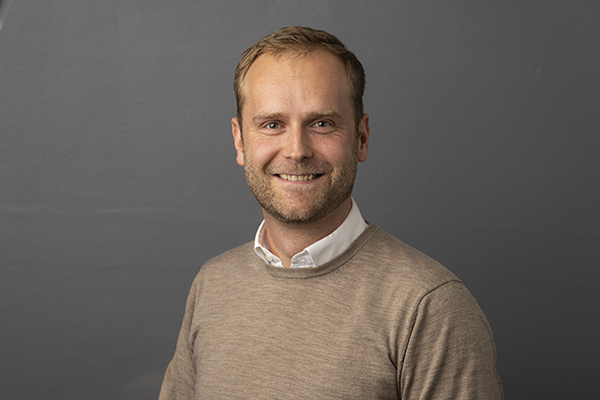Tore Bjerregaard Stage
Research leader

Project title
Elucidating the elusive molecular mechanism of chemotherapy-induced peripheral neuropathy
What is your project about?
My project aims to understand why cancer patients experience pain in the skin as a consequence of treatment with chemotherapy. This side effect affects a large proportion of patients treated with chemotherapy, and reduces their quality of life both during but also after concluding treatment. We use stem cells to generate the cells that are damaged, when the patients feel the pain. We expose the cells to chemotherapy to try to understand the mechanisms, that lead to the damage. If we can identify the cause of the pain, we expect we will be able to develop new therapies to treat or prevent it.
How did you become interested in your particular field of research?
I am a professor of translational pharmacology. This means that I combine laboratory-based studies with clinical studies (e.g., in healthy volunteers or in patients) to understand how drugs work. I have studied side effects for many years, as these can reduce the quality of life of many patients. If we can understand why side effects occur, we will be able to treat or prevent them from occurring. As an added benefit, this type of research sometimes shed light on basic human biology.
What are the scientific challenges and perspectives in your project?
The area of my research is not particularly new. Painful side effects to chemotherapy have been studies for decades. Historically, animal models have been utilized to study these side effects, but no effective treatments have emerged from this research. We have chosen to focus on cell models, that can be generated from stem cells. Even though this model is very useful, it is notoriously difficult to work with. It takes approximately 50 days to generate one batch of cells, and there are many things that can destroy the cells during this time. It can be very frustrating to work with the cells, but it is worth it, if you succeed. The cells form beautiful networks and is an outstanding model system to study these side effects, because they represent the cells that are damaged and causes pain during these side effects.
What is your estimate of the impact, which your project may have to society in the long term?
These painful side effects are a huge societal problem, as they reduce the quality of life of cancer patients and their health expenses. Furthermore, they increase health expenditure for both patients and society, as they may prevent patients from working due to the pain. If we can identify novel treatments for this side effect, we will be able to relieve the patients of pain and improve their quality of life substantially.
Which impact do you expect the Sapere Aude programme will have on your career as a researcher?
It is a big recognition of my work so far and of the idea of this project. The Sapere Aude: DFF Starting Grant will provide me with the opportunity to focus on my dream project with international collaborators and state-of-the-art research. It is very useful to have an extended period of time to work on larger project in a busy academic life, while under constant pressure to obtain funding, find time to do good teaching and administrative assignments.
The project is very ambitious, and I can not wait to get started with frontline research, that will hopefully help cancer patients.
Background and personal life
I am married to Line, and we have two boys age 2 and 6, that I spent most of my spare time with. Thus, we spend time on football fields (I am the coach), in zoo’s and on trips during the weekends. When the kids are tucked in at night, I spent time playing tactical computer games. I have done this for many years as I find it relieves stress because it forces my mind to not think about science. I also attend quite a few concerts and reading literature unrelated to my work. Finally, I love traveling and I am always planning the next trip for the family.
View all research leaders here
Research institution
University of Southern Denmark
Research field
Translational Pharmacology
City of your current residence
Odense
High school
Tornbjerg Gymnasium
